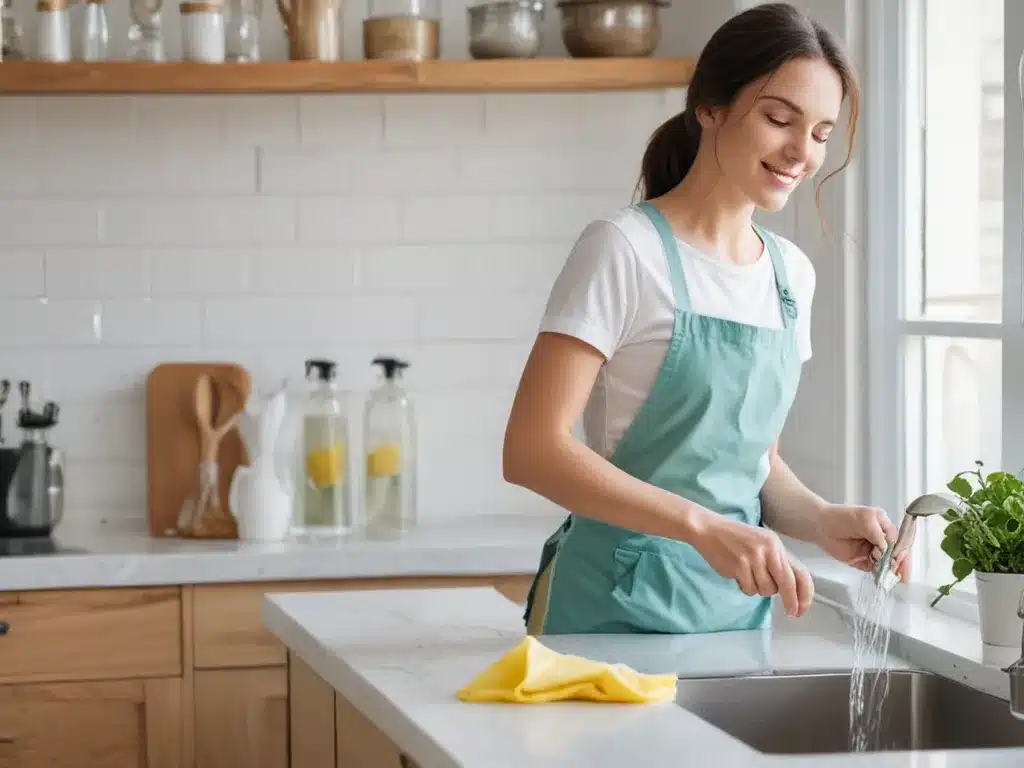Why You Should Avoid Harsh Chemical Cleaners
Exposure to the toxic chemicals found in many conventional cleaning products can be harmful to our health. Here are some reasons why I want to avoid them in my home:
-
Irritation and breathing issues: Harsh chemicals like ammonia, bleach, and volatile organic compounds (VOCs) can cause throat irritation, trigger asthma, and make breathing difficult. Long-term exposure may even lead to respiratory diseases.
-
Hormonal effects: Chemicals like phthalates and parabens act as hormone disruptors in our body. This can lead to reproductive issues, thyroid problems, and increased risk of breast cancer.
-
Kidney and liver damage: Ingredients like glycol ethers and triclosan are absorbed through the skin. Over time, they can cause kidney and liver damage.
-
Neurotoxicity: Chemicals like toluene, found in paint thinners, can affect our central nervous system. Exposure has been linked to impaired cognitive function, vision loss, and impaired motor skills.
-
Allergic reactions: Preservatives like methylisothiazolinone (MIT) and benzisothiazolinone (BIT) are common allergens. Exposure can cause skin irritation, rashes, blisters, and other allergic reactions.
-
Water pollution: Harsh detergents contain chemicals that do not biodegrade easily. When washed down the drain, they pollute water sources and harm marine life.
Make Your Own Natural Cleaning Products
The good news is, it’s easy to make your own safe and effective cleaners using natural ingredients you probably already have at home. Here are some simple recipes to try:
All-Purpose Cleaner
- Ingredients:
- 1⁄2 cup white vinegar
- 1⁄4 cup baking soda
- 10 drops lemon essential oil (for scent)
- Instructions:
- Mix ingredients together in a spray bottle.
- Shake bottle before each use.
- Spray directly on surface and wipe clean with a damp cloth.
Bathroom Cleaner
- Ingredients:
- 1⁄4 cup baking soda
- 1⁄2 cup vinegar
- 10 drops tea tree oil
- Instructions:
- Mix ingredients in a spray bottle.
- Shake well before use.
- Spray on surfaces in the bathroom and wipe clean.
Glass Cleaner
- Ingredients:
- 1⁄4 cup vinegar
- 1 tablespoon cornstarch
- 2 cups warm water
- Instructions:
- Whisk ingredients together in a spray bottle.
- Shake before each use.
- Spray a light mist on glass surfaces and wipe dry with a microfiber cloth.
Shop For Safer Alternatives
If you don’t want to make your own cleaners, look for products certified by third-party organizations like Green Seal or the EPA’s Safer Choice program. Here’s what to look for:
-
Plant-based ingredients: Look for cleaners made with plant-derived soaps and essential oils. Avoid petroleum-based solvents.
-
No parabens or phthalates: Stay away from cleaners containing these hormone-disrupting chemicals.
-
No VOCs: Volatile organic compounds can cause headaches and breathing issues. Opt for low- or no-VOC products.
-
No bleach: While bleach is an effective disinfectant, it’s very corrosive and irritating to the lungs. Seek out gentler disinfecting alternatives.
-
Biodegradable: Choose cleaners made from compounds that break down quickly and won’t persist in the environment.
-
Concentrated formulas: Products designed to be diluted with water are more eco-friendly, reducing plastic packaging waste.
-
Unscented: Fragrances usually contain synthetic compounds. Go for unscented varieties whenever possible.
Adopt Green Cleaning Habits
Changing what cleaners you use is a great start, but also adopt these habits to reduce your exposure to toxins:
-
Ventilate rooms when cleaning by opening windows or turning on fans. This helps clear out any lingering vapors or fumes.
-
Use microfiber cloths and mops which are more effective at trapping dirt and grease than old rags or sponges. This allows you to use less cleaning solution.
-
Buy an inexpensive HEPA filter air purifier for your home. HEPA filters capture fine particulates and allergens so they aren’t recirculated into the air.
-
Look for greener household products across all categories – laundry detergent, dish soap, personal care products, etc. The fewer synthetic chemicals in your home, the better.
-
Use a wet/dry vacuum when cleaning instead of sweeping. This traps dust particles instead of stirring them up into the air.
The Bottom Line
Harsh chemical cleaners are terrible for our health and the environment. Luckily, there are many simple ways to detoxify your cleaning routine by using natural alternatives or shopping for safer products. With a few adjustments, you can keep your home sparkling clean without the toxic side effects. What steps will you take today to green your home cleaning routine?







